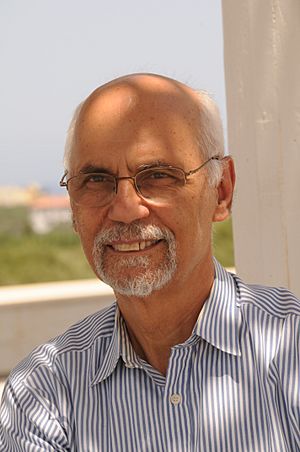Fotis Kafatos facts for kids
Quick facts for kids
Fotis Kafatos
|
|
|---|---|

Fotis Kafatos in 2008
|
|
| Born |
Φώτης Κωνσταντίνος Καφάτος
Fotis Constantine Kafatos 16 April 1940 |
| Died | 18 November 2017 (aged 77) Heraklion, Crete, Greece
|
| Alma mater | Cornell University (BS) Harvard University (PhD) |
| Awards |
|
| Scientific career | |
| Institutions | Imperial College London European Research Council Cornell University Harvard University European Molecular Biology Laboratory University of Crete Foundation for Research & Technology – Hellas |
| Thesis | The escape of moths from the cocoon: biochemical, physiological, morphological, and developmental studies (1965) |
| Doctoral advisor | Carroll Williams |
| Other academic advisors | Thomas Eisner |
Fotis Constantine Kafatos (born April 16, 1940 – died November 18, 2017) was an important Greek biologist. He helped start and lead the European Research Council (ERC) from 2007 to 2010. The ERC helps fund important scientific research across Europe. He was also the head of the ERC Scientific Council from 2006 to 2010.
Contents
Early Life and Education
Fotis Kafatos finished high school in Heraklion, Greece, in 1958. He then went to Cornell University in the United States, graduating in 1961. While there, he was guided by a famous scientist named Thomas Eisner. He also received help from the Fulbright Program and a scholarship.
He earned his PhD degree from Harvard University in 1965. His research was about entomology, which is the study of insects. His supervisor for this work was Carroll Williams.
Research and Career Highlights
Fotis Kafatos was a very influential Greek biologist. He played a key role in getting the Greek government interested in science. He helped set up the Faculty of Biology at the University of Athens and the University of Crete. He also helped create the Institute of Molecular Biology and Biotechnology (IMBB) in Heraklion.
Early in his career, he helped develop a method called complementary DNA (cDNA) cloning. This method is used to make copies of specific genes. He also studied how insect eggs form.
Kafatos was very interested in malaria research. Malaria is a serious disease spread by mosquitoes. He used his knowledge of insect genetics to understand how mosquitoes deal with the tiny parasites that cause malaria. He also helped sequence, or map out, the entire genetic code of the Anopheles gambiae mosquito in 2002. This was a big step in understanding how to fight malaria.
Leadership Roles in Science
Fotis Kafatos held many important positions throughout his career:
- He was a professor and chairman at Harvard University.
- He taught biology at the University of Athens and the University of Crete.
- He directed the Institute of Molecular Biology and Biotechnology (IMBB).
- From 1993 to 2005, he was the third Director-General of the European Molecular Biology Laboratory (EMBL).
- From 2005 until his death, he was a professor at Imperial College London.
- In 2007, he became the first President of the European Research Council (ERC).
Awards and Recognition
Fotis Kafatos received many awards and honors for his important work.
- He became a member of the US National Academy of Sciences in 1982.
- He was also a member of the American Academy of Arts and Sciences.
- In 2003, he was elected a Foreign Member of the Royal Society in the UK.
- He was also a member of the French Académie des Sciences and the Pontifical Academy.
- He was part of the European Molecular Biology Organization (EMBO).
Some of his major awards include:
- The Louis-Jeantet 25th anniversary prize in 2008.
- The Robert Koch Medal in Gold in 2010.
- The BioMalPar.EviPalaR Lifetime Achievement Award in 2011.
- The Leibnitz Medal in 2011.
He also received the Order of Merit of the Federal Republic of Germany. In Greece, he was awarded the Greek Order of the Phoenix. He received other awards and honorary degrees from universities in Greece and other countries.
Personal Life
Fotis Kafatos was born to Constantine and Helen Kafatos. He grew up in Heraklion, Crete, Greece, with his two brothers, Antonis and Menas. In 1967, he married Sarah Niles. They had two daughters, Helen and Zoe Myrto, and four grandchildren.
 | Sharif Bey |
 | Hale Woodruff |
 | Richmond Barthé |
 | Purvis Young |

